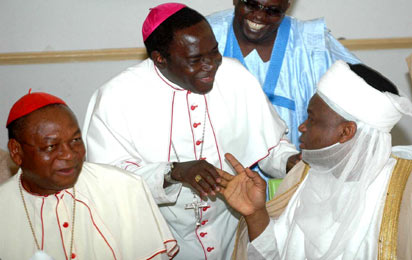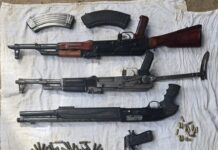Muhammad Sa’ad Abubakar III, the Sultan of Sokoto, Alhaji and Matthew Hassan Kukah, Catholic Bishop of Sokoto Diocese, have warned that the growing erosion of family values and weak parenting structures pose a threat to Nigeria’s national security and social cohesion.
The two religious leaders stated this on Monday at the opening ceremony of “Exercise Haske Biyu 2025,” held at the Armed Forces Command and Staff College (AFCSC), Jaji, Kaduna State.
The Sultan, who is also President-General of the Nigerian Supreme Council for Islamic Affairs (NSCIA), lamented the moral decay in society, linking it to the failure of families to instill values in children during their formative years.
He said the family remains the most fundamental building block of any society, and its deterioration naturally leads to the weakening of communities and institutions.
The Sultan said, “The smallest yet most critical unit in any society is the family. Weak families produce weak communities, and weak communities give rise to insecure nations.”
He noted that most of the moral values and behavioural patterns that define security consciousness are formed in early childhood.
“The world has not and will never invent anything to replace the family,” he added.
The Sultan cited historical lessons from the Sokoto Caliphate, noting that the writings of Sheikh Abdullahi Dan Fodio on child upbringing once served as a de facto social policy framework that reinforced good governance and societal stability.
He expressed concern that modern influences, ranging from the pursuit of illicit wealth to the pervasive impact of unregulated digital content and social media, are undermining traditional family structures and exposing children to harmful ideologies.
The Sultan called for the establishment of stronger marriage advisory boards, a value-based review of the national education curriculum, stricter regulation of digital platforms, improved drug control mechanisms, and renewed government commitment to tackling the menace of out-of-school children.
On his on, Kukah noted the strategic role of the family in peace-building and nationhood.
Delivering a paper titled “Relationship Between Family Dynamics and National Security”, Kukah, who was represented by John Joseph Hayab, said many of Nigeria’s contemporary challenges, particularly youth radicalisation and social unrest, are rooted in failed parenting and the collapse of traditional family systems.
According to him, “The family is the primary institution of socialisation. Many of the young people we see today, who are lured into crime, extremism, and social vices, are products of homes where proper upbringing has failed. ”
Kukah stressed that beyond weak parenting, structural issues such as limited access to formal education, economic hardship, and the growing obsession with materialism continue to push many youths toward destructive paths.
Quoting Proverbs 22:6 – “Train up a child in the way he should go, and when he is old, he will not depart from it”, Kukah stressed the enduring value of early moral instruction and discipline in shaping responsible citizens.
He added that a stable family environment nurtures emotional intelligence, civic responsibility, and tolerance—traits that are vital for national integration and conflict prevention.
“Families that model empathy, respect, and constructive engagement are more likely to produce citizens who are peace-builders rather than disruptors,” he said.
Kukah called for deliberate policy interventions that promote family welfare, including investments in community-based parenting programmes, psychosocial support services, and faith-based education on family values.










